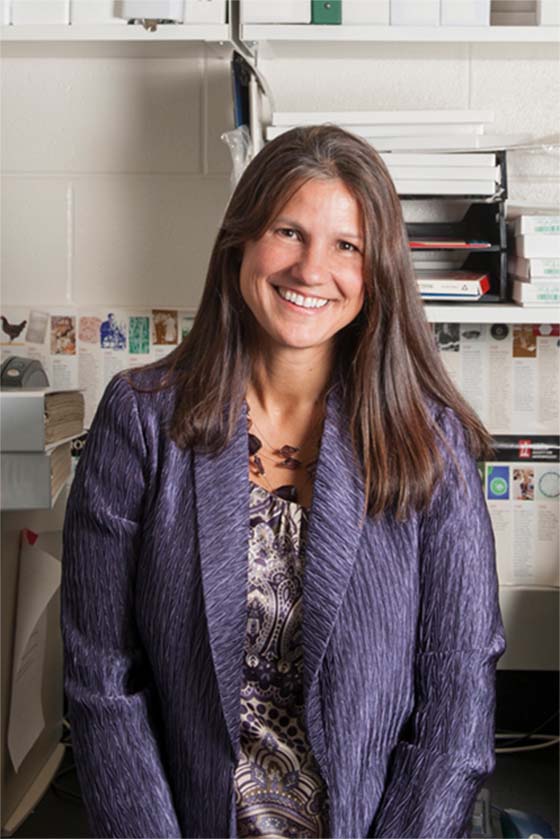Expanding coronavirus surveillance
One of the grants, worth $1.87 million, will leverage the sequencing tools and expertise found in MSU’s Genomics Core at the Research Technology Support Facility to help spot and track coronavirus variants that emerge after delta and omicron.
It’s easy to see how an MSU facility with decades of experience and state-of-the-art instruments would be an asset to the state, helping monitor the precise genetic identity of coronavirus infections detected in Michigan. What may be more surprising to learn is that Spartans who don’t have access to next-generation gene-sequencing tools will be lending a hand, too. Or, more accurately, lending some saliva.
As part of the grant, the Genomics Core will begin sequencing viruses detected in positive samples by MSU’s Early Detection Program, better known to the students, staff and faculty who use it as the Spartan Spit Kit.
Previously, when the Early Detection Program, or EDP, identified saliva samples testing positive for coronavirus, MSU would send those samples to MDHHS. The state health agency would then sequence the viral genomes found in those samples to determine which versions of the SARS-CoV-2 virus were present in the MSU community. Now, whole-genome sequencing will be done using the tools and expertise of the MSU Genomics Core, boosting the state’s virus sequencing and surveilling capacity.
The Early Detection Program provides an established source of coronavirus samples that will be augmented by building connections with other existing testing programs. Last year, CDC awarded MSU researchers $6 million to help close racial gaps in vaccination rates, in part, by working with medically underserved communities in Flint and West Michigan. Now, with support from MI-SAPPHIRE, MSU will be able to sequence viruses detected in those communities.
Thanks to MSU’s partnerships with Michigan health systems, researchers will also have access to coronavirus samples discovered in immunocompromised patients in the state’s hospitals. And, working with experts in its Veterinary Diagnostic Laboratory, MSU will be able to sequence coronavirus samples obtained from animals.

Professors Victor DiRita, Debra Furr-Holden and Jack Lipton (top to bottom)
“These are unique features of our MI-SAPPHIRE program that highlight the breadth of research strengths at MSU and take advantage of the investments made in the past two years in the EDP,” said Victor DiRita, one of the leaders of the project. DiRita is the Rudolph Hugh Professor and Chair of the College of Natural Science’s Department of Microbiology and Molecular Genetics. “We are expanding our understanding of viral sequence diversity tremendously with this grant.”
By sequencing more viruses from more sources, Spartan scientists will help better understand how novel coronavirus variants evolve and help identify them sooner.
“Sequencing technology and our knowledge of rapid pathogen evolution are coming together beautifully as we follow COVID,” DiRita said. “Programs like MI-SAPPHIRE help build the infrastructure to ensure we are keeping pace with the evolutionary changes occurring.”
“The state is saying let’s use the experts and expertise of the universities within the state. Let’s build up an infrastructure that uses MSU, U of M, Wayne State and Michigan Tech,” said Jack Lipton, architect of the EDP and a co-leader of MSU’s $1.87 million MI-SAPPHIRE award. Lipton is also chair of the College of Human Medicine’s Department of Translational Neuroscience.
“Then when the next pathogen comes around, you have the infrastructure in place,” Lipton said. “The state is building for the future and, in the process, answering questions for today.”
Completing the leadership team with DiRita and Lipton on the project is Debra Furr-Holden. Furr-Holden is also the leader of the $6 million CDC grant and the C.S. Mott Endowed Professor of Public Health, a professor in the Department of Epidemiology and Biostatistics and director of the Flint Center for Health Equity Solutions.
The team has also enlisted Spartan experts from across the university. This includes Kevin Childs, director of the Genomics Core and an assistant professor in the Department of Plant Biology; Brett Etchebarne, an assistant professor in the Department of Osteopathic Medical Specialties and an emergency medicine specialist with Sparrow Hospital; and doctor of veterinary medicine Kimberly Dodd, director of the Veterinary Diagnostic Laboratory in the College of Veterinary Medicine.
“These transdisciplinary teams are exactly what this pandemic and much of our public health work needs,” said Furr-Holden, who also serves on the Michigan Coronavirus Task Force on Racial Disparities created by executive order of Gov. Gretchen Whitmer. “This effort to identify and understand the spread of COVID and new variants within medically underserved communities will strengthen our capacity to give communities the knowledge and tools to fight back.”





